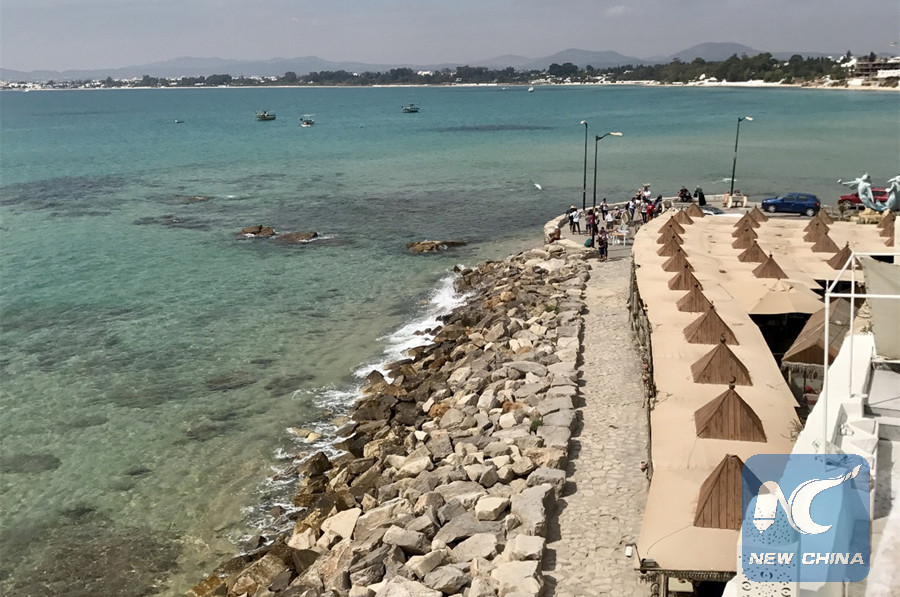
In the coastal city Hammamet, a fort which occupies the corner of ancient city wall, offers a marvelous view over the bay. (Xinhua/Liu Kai)
TUNIS, July 7 (Xinhua) -- In the archaeological museum in Sousse city in east Tunisia, a colorful one-square-meter mosaic of Chinese Taijitu has attracted many visitors.
The Taijitu, evenly divided into two halves by a central curve, represents the Chinese philosophy of "Yin and Yang".
The pattern description reads "mosaic with the classical yin-yang pattern in a square. Yin and Yang are the two regulating elements of universal dynamism."
"It is easy for Chinese to recognize it. This is a typical Taijitu, representing ... the fusion of Yin and Yang into a single ultimate," said Zhan Nanxian, a Chinese tourist.
According to archaeologists, this mosaic artwork was introduced to Africa through ancient Silk Road, and was praised as a testimony to the long history of China-Tunisia exchanges.
Zhan, a 66-year-old retired engineer from Chinese eastern province of Jiangsu, said "for many Chinese tourists, Tunisia was distant and mysterious in the past. As Tunisia announced visa exemption for Chinese citizens, this north African country has gradually attracted our attention."
Chinese tourists are showing more interest in new routes than traditional destinations.
In February 2017, Tunisia decided to offer visa-free entry to Chinese tourists for stay of no more than 90 days in the country.
Lying at the north point of the African continent, bordering the Mediterranean Sea, Tunisia is rich in tourism resources, especially the beautiful beaches along the coast. The peak season for seaside holidays in Tunisia lasted from June to October each year.
Tunisia attaches great importance to boosting its tourism sector, which accounted for about 8 percent of the country's GDP. Resort centers were established along the eastern coastal areas, among which Sousse and Hammamet are the most popular tourism destinations.
With a history of thousands of years, Sousse was once a military and commercial hub, as well as a typical Islamic city. Composed of Arab elements and military functions, the ancient building complex in medina was well conserved, and "Medina of Sousse" was also listed as a World Cultural Heritage in 1988.
At the Port El Kantaoui, a modern symbol of Sousse with over 300 boats moored, visitors could set sail on the sea or enjoy time at seafront cafes.
Tunisia witnessed a slump in its tourism since 2015 when the country was hit by three major terrorist attacks, including one bloody attack at a hotel in Sousse claiming the lives of over 30 people, mostly foreign tourists.
"Three years have passed since Sousse attack, and I feel at ease here, with armed police patrolling the streets, and hotels and supermarkets equipped with necessary security measures," said Wang Yifeng, a 26-year-old self-guided Chinese traveler, who was taking a stroll along the beach in Sousse.
With the visitors' restoring confidence in the country's security situation, tourism in Tunisia started to revive in 2017.
The coastal city of Hammamet, built by Phoenicians and once a fortified village of fishers and farmers, is only a few kilometers away from Sousse. The fort, which occupies the corner of ancient city wall, offers a marvelous view over the bay.
Tourists always take a break at the famous cafe Sidi Bou Hadid, to have a panoramic view of the bay and the sunset at sea.
Djaziri Boubaker, the 41-year-old manger of the cafe, said "Chinese tourist groups usually come to our cafe, touring around and taking photos, enjoying the atmosphere here."
"In the past, we seldom saw Chinese tourists, but in the recent two years, the number has increased sharply," said Boubaker. "We welcome more Chinese tourists to visit our country."
In the first half of this year, over 15,000 Chinese tourists visited Tunisia and an estimated 40,000 will visit Tunisia in 2018, according to Tunisian National Tourist Office.
Since the visa-free entry in February 2017, China has become one of Tunisia's fastest-growing tourism markets, with tourist arrivals rising from about 7,400 in 2016 to over 18,000 in 2017.
Tunisia also welcomed the first Chinese chartered-flight tourist group in February this year.
Chinese tourists made a total of 130 million overseas trips in 2017, with total spending amounting to 115 billion U.S. dollars, according to a report jointly released by China Tourism Academy and online travel agency Ctrip.
According to the United Nations World Tourism Organization, China is considered as world's fastest growing tourism market.
Tunisian President Beji Caid Essebsi said Tunisia welcomes more tourists from China, during his meeting with a visiting Chinese delegation in late June.
Tunisian Minister of Tourism Salma Elloumi said Chinese market would be a significant factor to revive Tunisian tourism industry.

